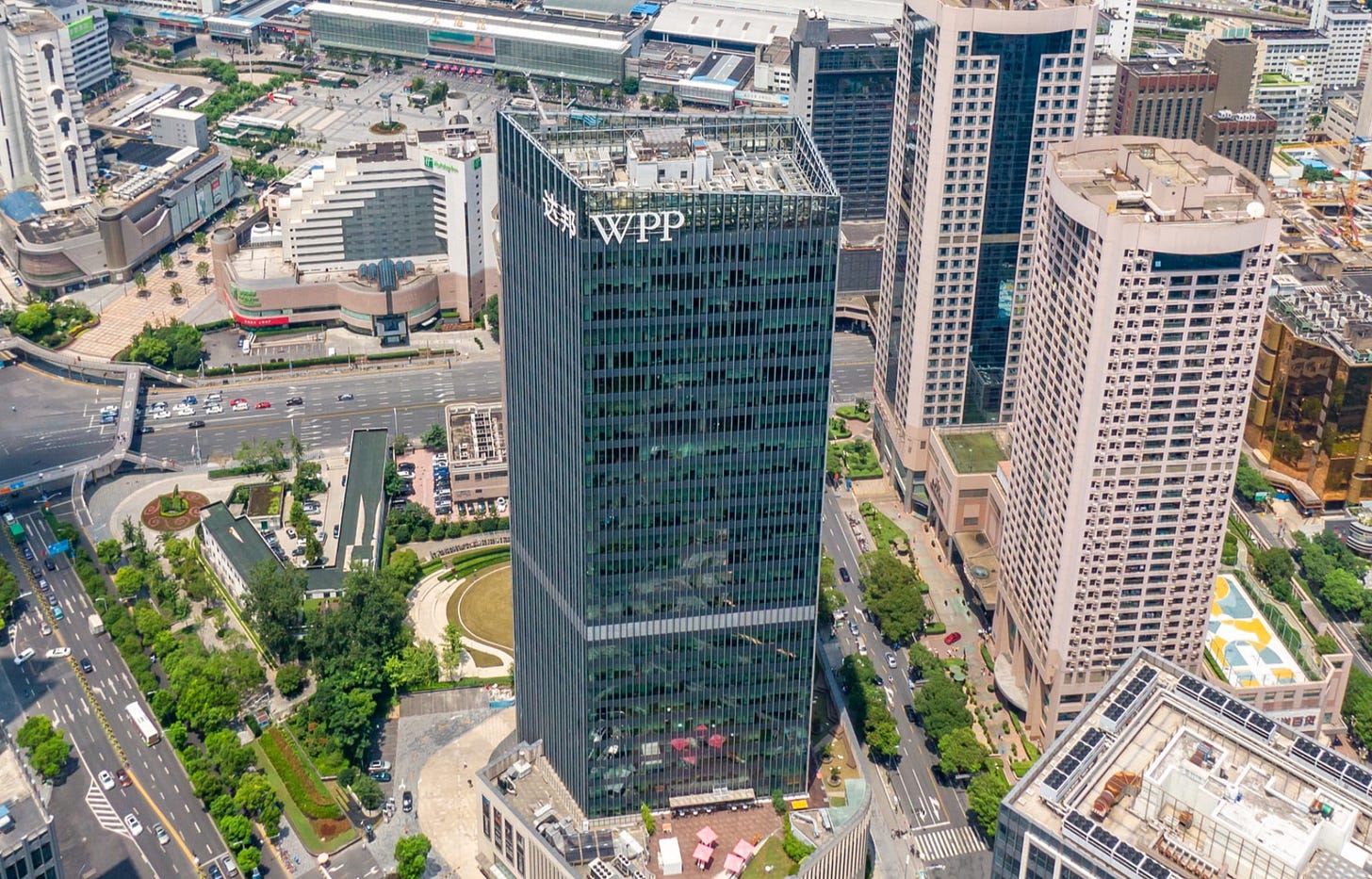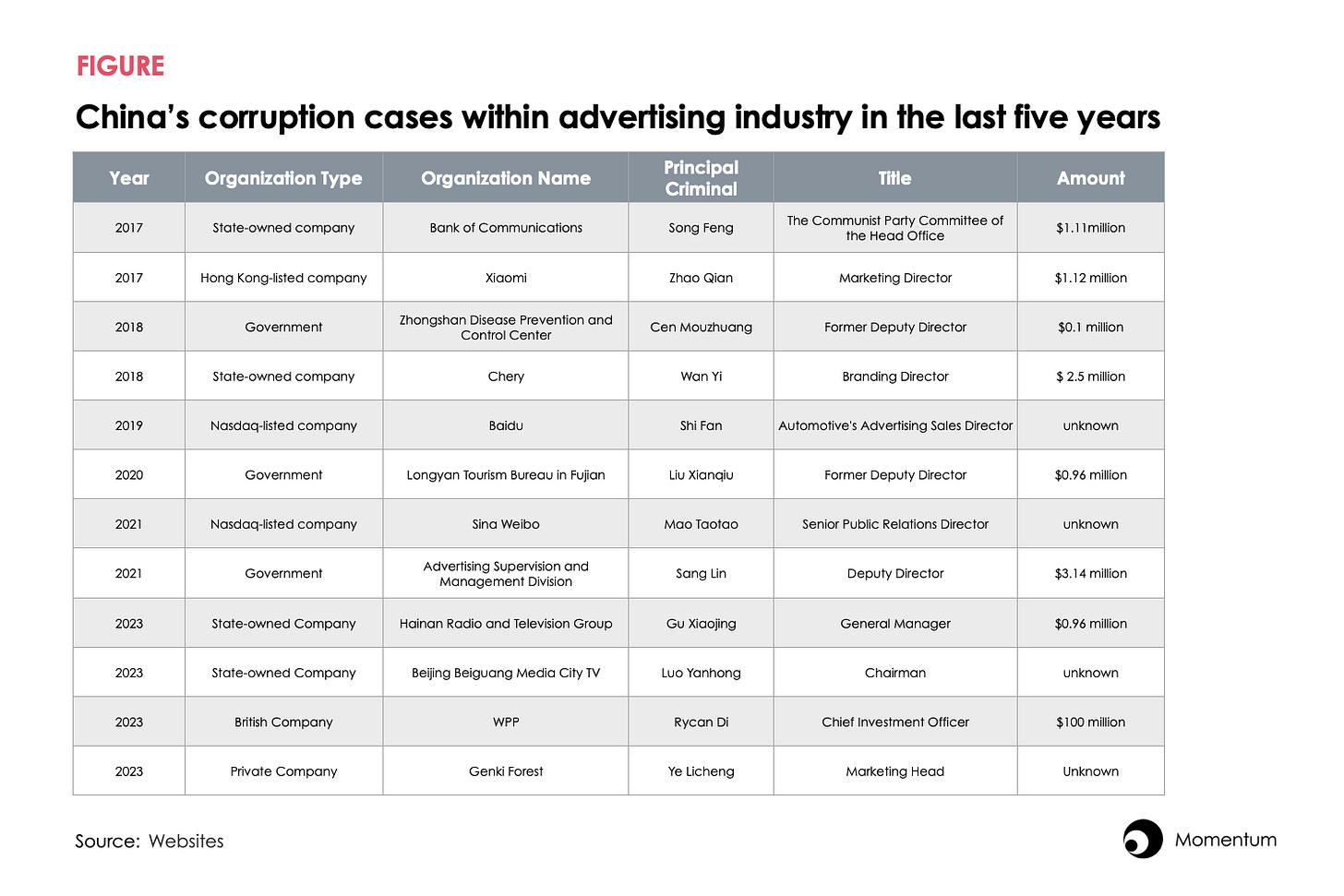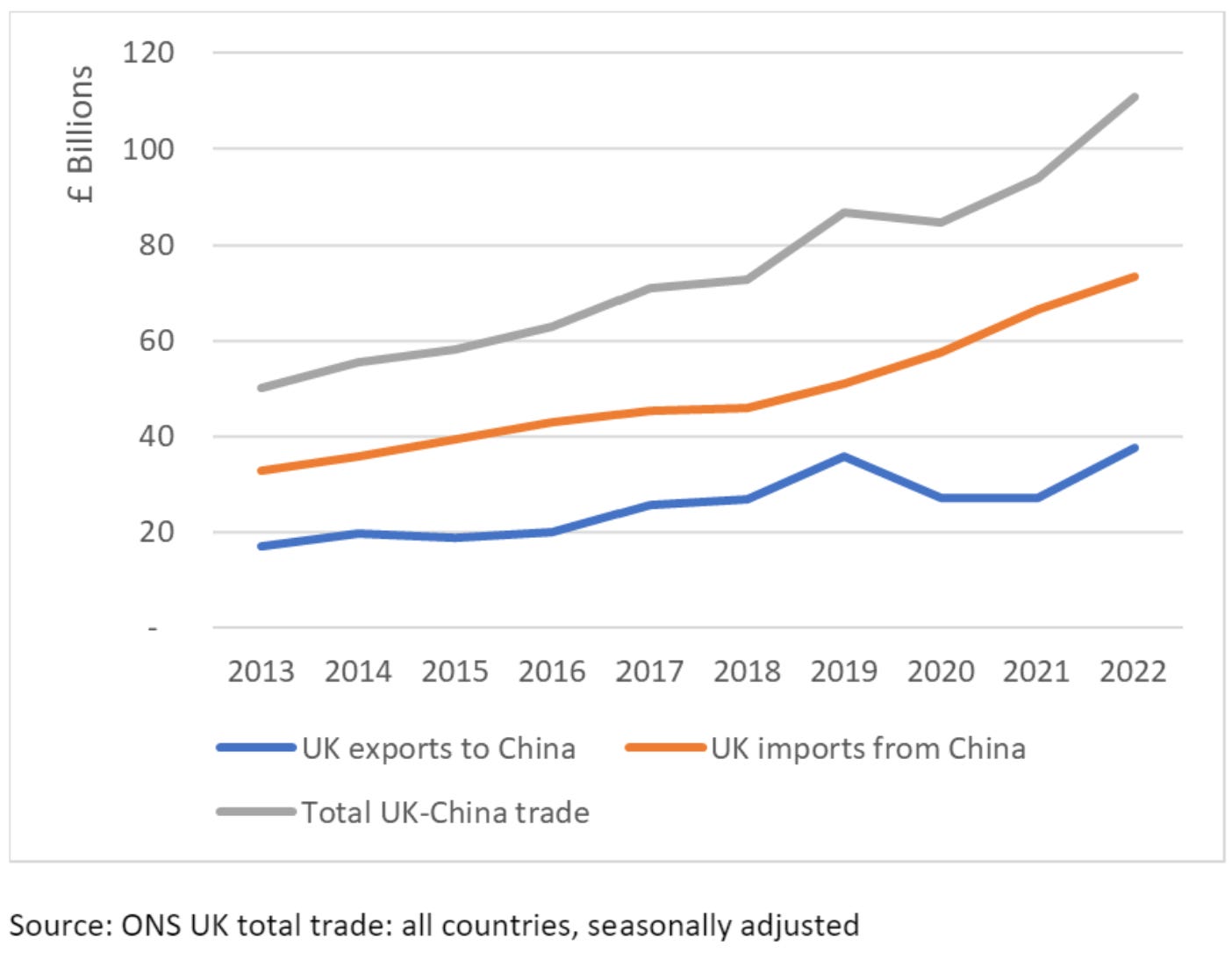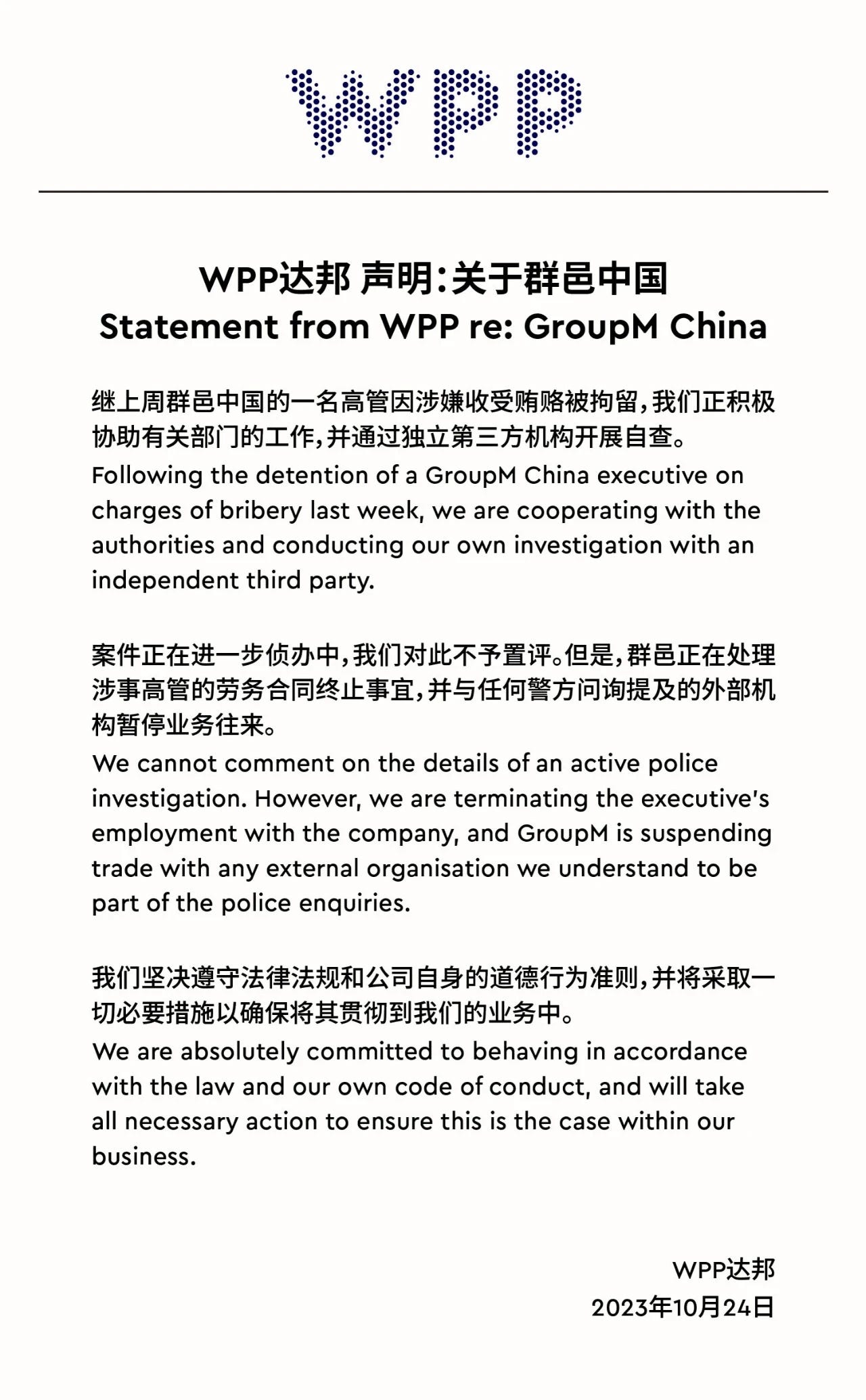An inside look into the WPP scandal: A closer examination
The recent corruption crackdown, this time with British Advertiser WPP, has led some to claim that the Chinese government is targeting foreign companies, but is there any truth to the rumors?
Inspired by my conversation with independent business journalist and analyst Yaling Jiang (feel free to check out her newsletter), it has become clear that there are a number of misconceptions floating around about the WPP scandal in China. While this may seem slightly off-topic from my core focus, it's essential to address, as there are limited perspectives provided from within WPP China and the industry. As a former member of WPP, I decided to provide my perspective and give insight into what might really be happening.
On October 21st, the Shanghai police issued a statement on Weibo, China's equivalent of Twitter, regarding a scandal involving:
The Economic Investigation Division of the Shanghai Public Security Bureau, in collaboration with market supervision authorities, uncovered a case of commercial bribery and arrested three suspects, including a senior executive named Rycan Di, from an advertising company (GroupM China).
Preliminary investigations revealed that from 2019 to February 2023, Rycan Di (Chief Investment Officer), Yao Lan (General Manager of Digital Media Buy), and Diana Hong (Former Head of OTV / OTT), while working at the advertising company, took advantage of their positions to accept substantial bribes. Currently, the three individuals have been criminally detained on charges of non-state personnel accepting bribes(非国家公职人员受贿罪), and the case is under further investigation.
Global mainstream media promptly picked up this incident, with many outlets linking it to espionage cases and suggesting it was an intentional attack on foreign businesses. Here are a few examples:
The investigation is likely to resonate within China's foreign business community, which is already on edge due to a crackdown on consulting and due diligence firms, as well as a new national security law. This has led some business leaders to express concerns that foreign firms may hesitate to invest further in the market.
While the government hasn't accused GroupM of espionage, it described the case as concerning commercial bribery. This year, Chinese authorities have raided the offices of due-diligence firm Mintz Group and expert-network consulting firm Capvision, which closely collaborated with foreign consulting firms in China.
Shanghai police raided WPP's offices and detained a GroupM executive and two former employees. This move is part of a series of crackdowns in China on foreign firms. The government is also investigating Foxconn Technology Group, Apple Inc.'s manufacturing partner in China.
However, the narrative within the domestic Chinese media landscape is distinctly different. Chinese media outlets primarily focus on the corruption angle, with a particular emphasis on financial impropriety. This is because those arrested are linked to GroupM, a media buying company within WPP, which is a company closely associated with money but not sensitive secrets.
4A Advertising Community (4A广告圈):
The executives involved have amassed extensive experience within the company and essentially controlled GroupM's media buying business in China. Online rumors suggest that the sum involved in this case reached 700 million yuan (around $100 million), though this remains unconfirmed. However, it's highly likely that the amount involved is already in the hundreds of millions.
007 in the PR industry(公关界的007)
The story of the gossip is as follows: A media outlet uncovered the bribery behavior of a supplier from GroupM China. The supplier identified a person of interest named Yao Lan. Subsequently, Yao Lan exposed another person of interest, his superior, Rycan Di. As a result, Rycan Di arranged for someone to fracture Yao Lan's leg.
Imagine a billboard advertisement in a remote and unknown area. It is unlikely to contain sensitive information that would concern the Communist Party. However, an untraceable billboard can often be used for money laundering advertising projects without being easily detected. The owner of the billboard and the advertising company only need to work together to raise the price of this worthless billboard, convince the advertising decision-makers, and then share the illegal profits with the project participants.
Furthermore, it's important to note that anti-corruption efforts in the advertising industry didn't start suddenly with GroupM. While GroupM holds a 15% market share, it doesn't represent the entire industry. The fight against corruption in the advertising sector has been ongoing within government bodies, state-owned enterprises, and private companies.
To gain a better understanding of the overall picture of the anti-corruption situation in the Chinese advertising industry, I have compiled some high-profiled while confirmed corruption cases in the industry over the past five years including WPP's case:
Of course, those are only the disclosed criminal cases, and there may be many cases that are handled quietly. But nevertheless, this at least indicates that foreign-funded companies are not being singled out and targeted by Chinese regulators.
Furthermore, WPP China's business ranks fourth globally. The WPP CEO has made a solemn commitment to long-term investment in China, the world's second-largest market in the advertising industry. Additionally, trade collaboration between China and the UK reached record levels in 2022, encompassing both imports and exports. From an economic perspective, the Chinese government also has no motivation to intentionally create unnecessary obstacles for this British giant.Considering everything, the arrest of WPP executives does not seem to be exclusively aimed at foreign businesses or specifically targeting British companies. It seems more like an expansion of the anti-corruption scope.
Although there is no direct evidence, I feel that the expansion of the anti-corruption scope at this time may be related to the US SEC's announcement in early October of the penalty decision against the Chinese subsidiary of an American advertising company for bribing Chinese officials. This may have pressured the Chinese government to also pay attention to foreign-funded affiliated advertising companies in its anti-corruption efforts. Otherwise, it could appear that China is not doing enough domestically to combat corruption.
Returning to the WPP case, will the case conclude here with the arrest of the three executives?
I think the answer is probably no in this game. As I mentioned earlier, this money laundering game requires multiple parties to participate in order to complete, especially for large-scale money laundering schemes. According to the WPP, they have already ended their partnership with the advertisers in question. This implies that the advertisers involved may be subject to investigations, and I personally believe there is a strong likelihood of corrupt practices being involved.
Zoom out to the bigger picture
Although punishment certainly can serve as a deterrent to illegal business activities, the punitive measures alone are not a sustainable, long-term solution.
In my view, enhancing transparency is the first and foremost solution because this can effectively reduce the media information barrier, allow for better scrutiny and monitoring, and also increase the likelihood of culprits being caught, thereby decreasing the potential for corruption.
In fact, the China Advertising Association (CAA), Miaozhen - China's largest third-party ad monitoring agency, and Tencent have consistently investigated and exposed the issue of traffic fraud in China's advertising sector. This issue mainly affects digital ads, social media, live streaming, and even out-of-home (OOH) placement, including non-human traffic (usually referring to fake clicks and impressions), fake followers or comments on social media, and even false reporting of non-airing advertising activities.
After brand owners and third-party companies took the lead in investigating and publicly exposing traffic fraud issues, more brand owners or their marketing teams have come to realize the significant budget losses that can be caused by traffic fraud. As a result, they have started to be more stringent in selecting trustworthy advertising partners and closely monitoring media placements.
At the same time, the government has classified advertising traffic fraud as a criminal act and launched large-scale crackdowns on fraudulent actors in the industry.
The developer of "Star Support (星援)" sentenced for faking Weibo data is a notable case. It was revealed that the criminal team managed to crack the technical parameters and algorithms of Sina Weibo, allowing them to manipulate actions such as reposting, commenting, and liking. Believe it or not, the app has made around one million dollars in only six months by relying on falsified data.
However, to this day, there is still a lack of comprehensive research and disclosure of corruption issues such as kickbacks or bid-rigging inside the industry.
Will the WPP incident become a wake-up call for further transparency in China's media buying supply chain?
I am unsure. The good thing is, I feel that many people have paid more attention to media buying corruption because of this incident. However, true industry transparency still requires big players within the industry or government to drive it forward as the supply chain of media buying is very fragmented and complex now.
In the end, no matter how the WPP incident develops, I wish the CCP would proactively engage in open communication with the international community on such sensitive matters, rather than reacting only when misunderstandings become consensus. This would reduce speculation and facilitate the building of trust and understanding with people and businesses throughout the world.





